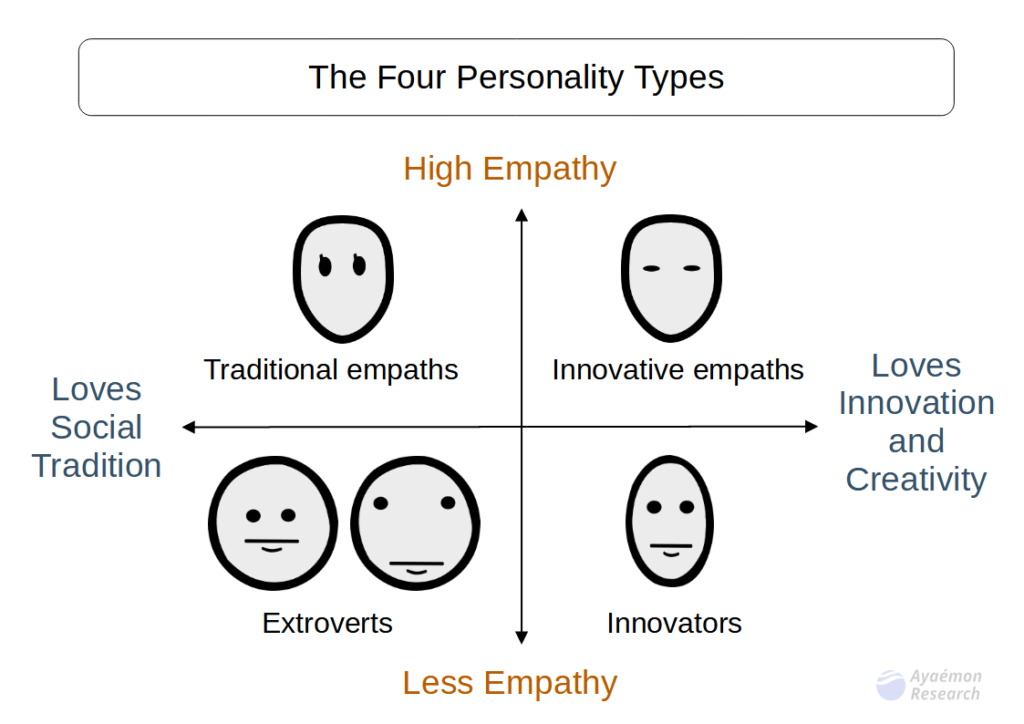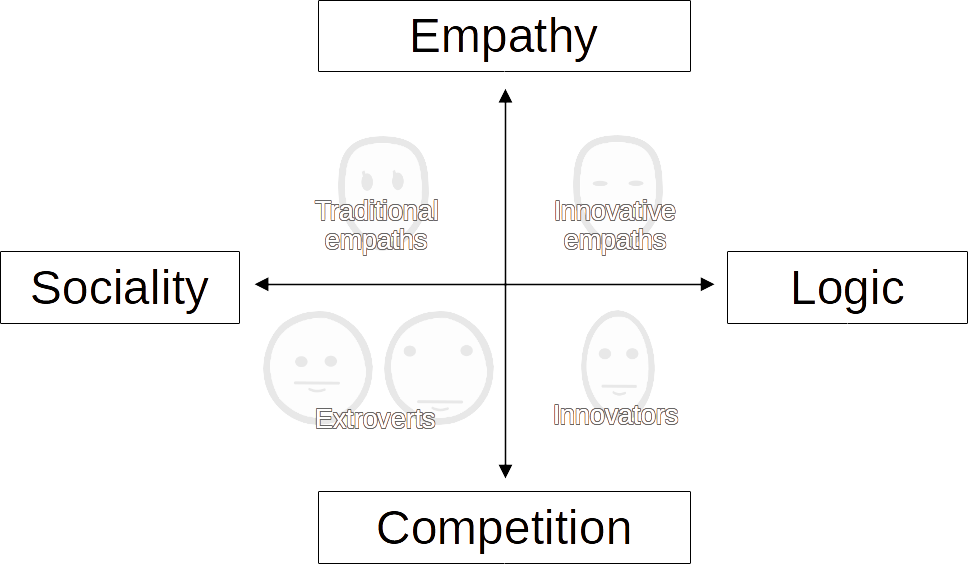These days, I have talked about the attractiveness of innovative, empathic people. Today, I will explain another one from the perspective of spirituality.
How to maximize our attractiveness
Sometimes, we want to maximize our attractiveness, especially if we don’t know what we can do. We cannot live in the same way as our surroundings. That means we should already have individual talents that others don’t. If we can show our talents, our life satisfaction will improve dramatically.

However, we sometimes don’t know them. One of the typical odd natures is empathy accompanied by creativity. No one around us has such individuality or knows how to use it. That often troubles us. That makes us lose confidence and imitate other styles that don’t suit us.
Today, I will introduce one of our attractiveness. It is spirituality. This knowledge might allow us to show our talents.
The four types of personalities
To explain it, let me introduce the four types of personalities that I often use, as shown in the following image:

We classify our personalities by two axes. One axis is highly empathic or not. The other is that they like to follow social tradition or change their style effectively.
The four kinds of sense
In other words, we could have four kinds of sense: competition, sociality, empathy, and logic. It is as follows:

We focus on empathy and logic in this article. Spirituality is a sense of empathy based on logic.
An explanation of each personality
There are four types of personalities. Let’s look at them from the perspective of spirituality. It is as follows:
- Extroverts: People with no spirituality. They tend to be advantageous during a stable period. They are the social majority.
- Traditional empaths: People who can feel the emotional side of spirituality. However, they cannot use it in a confused situation due to a lack of logical sense.
- Innovative empaths: People who have spirituality. They can use their spirituality to improve their lives. They tend to show their talent in a confusing era. They are the social minority.
- Innovators: People who can understand the logical side of spirituality. However, they cannot use the emotional power of spirituality due to a lack of empathy.

Let me explain spirituality below.
What is spirituality?
One of the symbolic attractiveness of innovative empaths is spirituality. Spirituality is an imaginary power with emotional feedback based on solid logic.
Spirituality looks like a mysterious power if we look at it from the perspective of extroverts. A good metaphor is the concept of elves and Chinese cultivators, as I mentioned in the previous article (this article).
Both of them can get wisdom and power from invisible beings in nature. Elves can communicate with spirits, the invisible fairy-like life. Chinese cultivators control Qi, the invisible spiritual energy. They look like supernatural things.

However, spirituality is not such a mysterious thing. It is just a sense of empathy based on logic. It is indispensable in a confused era.
The meaning of spirituality
In a stable era, people don’t need spirituality because they can live the same way as yesterday. Even if innovators create innovations, people can choose a new or old way.
On the other hand, in a confused era, people need spirituality because they will decline without it. Spirituality gives us future predictions and the mental power to take action.

The empathic side of spirituality
Two things make up spirituality. The first is empathy.
Empathy gives us emotional feedback from the imagination of the future. That allows us to prepare for the future.
For example, empathic people like us can feel fear of future risks. There is a possibility of losing food or money in the future. At the same time, we can have energy through hope if we know how to deal with it. That allows us to limit our current desires and act for the future. We might be more frugal and save money.
This emotional power works well during a confused era because we can prepare for it. In other words, empathy gives us mental patience for the future.

Innovators envy it because they cannot be patient for the future. They can only live now. Although they can calculate the risk logically, they usually prioritize their current desires because they cannot feel fear for the future. That makes them live only now and think, “It will be all right” without preparations.
Although such a fearless personality for the future works well during a stable period, it doesn’t work during the confused era. We have to prepare for the future during such a period. Innovators feel they lack mental patience during that period. That makes them wish for spirituality.
The logical side of spirituality
Logic is the other thing that makes up spirituality.
Logic gives us the wisdom to predict the future correctly. For example, logical people sometimes find conditions that cause disasters, such as poor crops, epidemics, or the decline of their state. They are often true because they are based on logic.
In addition, logic gives us solid countermeasures against future risks, even without experience, even if our materials are restricted.

Traditional empaths envy it because they don’t have logical sense. They can neither predict the unusual future nor create new countermeasures. They can only use what they know. That leaves them at a loss when the situation changes.
Why is spirituality so mysterious?
When those two elements—empathy and logic—are combined, it looks like a mysterious power for many people, except for innovative empaths.
Assume we are traditional empaths or innovators. We faced a turbulent period. Many people are confused and don’t know what to do.
Innovative empaths can gain new wisdom they don’t yet know, even in such a situation. They can predict the future with several current phenomena based on their logic.

It looks like communicating with an invisible fairy and gaining answers from them. In addition, they have the mental power to limit their current desires and act for the future. It is like controlling an invisible power within us.
Perhaps those impressions toward innovative empaths created the concept of spirit. They wanted the talents of innovative empaths.
The two aspects of spirituality
That may be why spirituality has two aspects.
One is the method to obtain wisdom from the gods within us. Perhaps you know it, such as channeling, communicating with the higher self, or fortune-telling. Traditional empaths usually use them because those methods don’t require logical reasoning. “The gods say so” is a good justification to escape from reasoning and being creative.

In other words, they wanted to predict the future like innovative empaths, but they could not be logical. That made them use those methods to pretend to be innovative empaths. Perhaps that made spirituality occultism.
The other side of spirituality is a method to control our inner mental power to limit our current desires. Innovators wish for it. For example, there are techniques of Qi in China and Ayurveda in India. Both of them are based on meditation. Perhaps their desire to control our inner mental power created it.
The true spirituality inside us
However, spirituality is not such a mysterious power. It has just two elements: empathy based on logic.
In other words, if we are innovative empaths, we don’t have to try to obtain those mysterious powers because we already have them. We don’t have to pretend to be the voice of the gods. We don’t have to master Qi or meditation. We don’t have to pretend to be someone who pretends to be us.

We can do it naturally, although it may look like godlike power from other personalities. Empathy based on logic brings us true spirituality. That is one of our talents.
Conclusion
If we are innovative empaths, we have attractiveness. One of them is spirituality.
Spirituality allows us to live better, especially during a turbulent era. It is not a mysterious power. It is the natural personality of innovative empaths.
This knowledge might allow us to show our talents.
Thank you for reading this article. I hope to see you in the next one.


